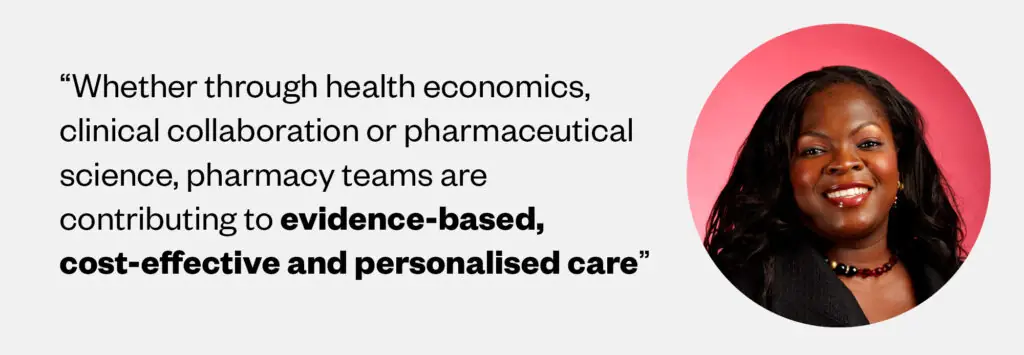In my previous column, I explored the research methods used in high-impact pharmacy studies published in RPS journals in 2023 and 2024. This month, I focus on review articles that evaluate or support the development of pharmacy services and pharmaceutical products. Review papers, especially systematic reviews, critically assess recently published research papers to present a concise and authoritative view of the current state-of-the-art in a field to the reader.
With the expansion of pharmacist and pharmacy technician roles both nationally and internationally — particularly in delivering individualised pharmaceutical care — it is essential to build and share robust evidence assessing the impact and cost-effectiveness of these services.
Evaluating the value of pharmacy services
A systematic review by Price et al1. synthesised international economic evaluations of pharmacy services. Of the 75 studies included, 67 studies were cost-effectiveness analyses, 6 were cost–benefit analyses and 2 were cost–consequence analyses. A total of 38 studies were model-based and 37 studies were trial-based evaluations. The most cost-effective interventions were pharmacist-led medication reviews, adherence support and chronic disease management for conditions such as type 2 diabetes, hypertension and warfarin/INR monitoring. While the findings support the economic value of these services, none of the studies reported all 28 items from the CHEERS (Consolidated Health Economic Evaluation Reporting Standards) checklist2, indicating variability in reporting quality.
Pharmacists and sleep health
Another valuable contribution comes from Ashkanani et al3. who conducted a systematic review and thematic synthesis on pharmacists’ roles in managing sleep disorders. Analysing 34 studies — mostly from high-income countries — they identified three key pharmacist roles: deprescribing, collaboration with other healthcare professionals and acting as educators in sleep management. The review underscores pharmacists’ expanding scope beyond traditional dispensing roles.
Innovations in drug delivery: Hydrogel microneedles
Within pharmaceutical sciences, a review by Wu et al.4 examined the promising use of hydrogel microneedles as tools for controlled drug delivery. These microneedles show growing utility in managing diabetes, cancer and for clinical monitoring, as well as offer potential for skin care and wound healing. However, the review also noted an important limitation: while hydrogel microneedles are biocompatible and have strong drug-loading capacity, they often do not fully release the drug, resulting in low bioavailability and suboptimal pharmacodynamic effects.

Why systematic reviews matter
These reviews highlight the importance of strengthening the evidence base for pharmacy practice innovations and pharmaceutical technologies in addressing local, national and global health challenges. Whether through health economics, clinical collaboration or pharmaceutical science, pharmacy teams are contributing to evidence-based, cost-effective and personalised care. Systematic reviews are a valuable method for consolidating global findings, identifying practice gaps and informing future research, education and service development across the profession.
The question posed by Professor Parastou Donyai and asked in the ‘Getting into research’ podcast in June 2024 remains relevant. Her question was for us to decide as professions and individuals: “Who is going to do the research that is fundamental to pharmacy? Is it going to be others, or is it going to be pharmacists?”
This is a question that invites both reflection and action. As healthcare grows more complex and pharmaceutical innovation accelerates, pharmacy professionals are well placed to help build the evidence that drives better outcomes.
Multidisciplinary collaboration is essential — alongside pharmacy leadership — in identifying evidence gaps and shaping the research that addresses them. The path ahead will take effort, but the potential for meaningful impact is strong. If we want pharmacy to stay relevant, effective and truly patient-focused, we need to be at the research table — not as observers, but as confident contributors.
If you wish to conduct a review (examples include narrative, systematic, scoping and literature reviews), or any other health services research, you can find out more from the Royal Pharmaceutical Society’s (RPS) research and evaluation guides and the research e-learning modules for pharmacists and pharmacy technicians , developed by the RPS for the National Institute for Health and Care Research.
The RPS science and research team also provides continued support services to members across all career stages, including assistance with interviews and application guidance. Find out more here.
- 1.Price E, Shirtcliffe A, Fisher T, Chadwick M, Marra CA. A systematic review of economic evaluations of pharmacist services. International Journal of Pharmacy Practice. 2023;31(5):459-471. doi:10.1093/ijpp/riad052
- 2.Husereau D, Drummond M, Augustovski F, et al. Consolidated Health Economic Evaluation Reporting Standards 2022 (CHEERS 2022) statement: updated reporting guidance for health economic evaluations. BMJ. Published online January 11, 2022:e067975. doi:10.1136/bmj-2021-067975
- 3.Ashkanani FZ, Lindsey L, Rathbone AP. A systematic review and thematic synthesis exploring the role of pharmacists in supporting better sleep health and managing sleep disorders. International Journal of Pharmacy Practice. 2023;31(2):153-164. doi:10.1093/ijpp/riac102
- 4.Wu Y, Tang Z, Ma S, Du L. The promising application of hydrogel microneedles in medical application. Journal of Pharmacy and Pharmacology. 2023;75(8):1011-1020. doi:10.1093/jpp/rgad058


